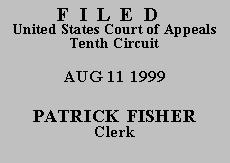

|
CHRISTOPHER R. SALEH,
v.
JUANITA NOVAK; ATTORNEY
GENERAL OF THE STATE OF
COLORADO |
|
This case is before the court on Christopher R. Saleh's pro se application for a certificate of appealability ("COA") and motion to proceed on appeal in forma pauperis. Saleh seeks a COA so that he can appeal the district court's dismissal of his 28 U.S.C. § 2254 habeas petition. See 28 U.S.C. § 2253(c)(1) (providing that no appeal may be taken from any final order in a § 2254 proceeding unless the petitioner first obtains a COA). Because Saleh has not "made a substantial showing of the denial of a constitutional right," this court denies his application for a COA and dismisses the appeal. See id. § 2253(c)(2) (setting forth showing petitioners must make in order to obtain a COA).
In his § 2254 habeas petition, Saleh alleged that he was convicted in Colorado state court in 1998 of reckless second degree assault and of being a habitual criminal and that he was sentenced to a thirty-two year term of imprisonment. He further alleged that his direct appeal was still pending before the Colorado Court of Appeals. Despite the fact that Saleh had not exhausted his state remedies,(1) Saleh sought to challenge the constitutionality of Colorado's Habitual Criminal Act on the ground that it is applied more often to eligible male offenders than eligible female offenders. Saleh alleged in his petition that he was not required to exhaust his state remedies because to do so would be futile. In particular, Saleh asserted that other inmates had previously pursued this claim in state courts and that they had all been denied relief.
In response to the petition, a magistrate judge issued an order to show cause why the petition should not be dismissed for failure to exhaust state remedies. Although recognizing the existence of a narrow futility exception to § 2254(b)'s exhaustion requirement, the magistrate judge ordered as follows:
[Saleh] fails to provide any citation to a recent Colorado Supreme Court decision that addresses and rejects the precise issue he raises in this action. The court's own research has not revealed such a case. Therefore, it appears that the futility exception is not applicable and that the habeas corpus application should be denied for failure to exhaust state remedies. Mr. Saleh will be given an opportunity to demonstrate that the futility exception is applicable.
In response to the show-cause order, Saleh again provided an unsupported assertion that "[f]ellow prisoners have filed court actions in the Colorado Court of Appeals and [were] denied relief on this issue." Saleh further identified one of those fellow inmates by name: Clovis Carl Green, Jr.
After reviewing Saleh's response to the show-cause order, the district court dismissed Saleh's petition without prejudice for failure to exhaust. The district court began by noting that "[t]he exhaustion requirement is not one to be overlooked lightly." Hernandez v. Starbuck, 69 F.3d 1089, 1092 (10th Cir. 1995). Against this backdrop, the district court concluded that Saleh's generalized claims of futility were simply insufficient. Furthermore, the court noted that it could not find any cases arising from Colorado involving "Clovis Carl Green, Jr." Accordingly, the district court concluded that Saleh had not carried his burden of demonstrating that exhausting this claim in Colorado state court would constitute a futile act.
This court has considered Saleh's application for a COA and appellate brief, the district court's order, and the entire record on appeal. That review demonstrates that the district court's dismissal of this case without prejudice for failure to exhaust is not reasonably debatable among jurists of reason, subject to a different resolution on appeal, or deserving of further proceedings. See Barefoot v. Estelle, 463 U.S. 880, 893 & n.4 (1983). Accordingly, Saleh has not made a substantial showing of the denial of a constitutional right and is not entitled to a COA. See 28 U.S.C. § 2253(c)(2).
Saleh's application for a COA and motion to proceed on appeal in forma pauperis are both DENIED. This appeal is hereby DISMISSED.
ENTERED FOR THE COURT:
Michael R. Murphy
Circuit Judge
*. This order and judgment is not binding precedent, except under the doctrines of law of the case, res judicata and collateral estoppel. The court generally disfavors the citation of orders and judgments; nevertheless, an order and judgment may be cited under the terms and conditions of 10th Cir. R. 36.3.
1.See 28 U.S.C. § 2254(b) (setting forth exhaustion requirement); Dever v. Kansas State Penitentiary, 36 F.3d 1531, 1534-35 (10th Cir. 1994) (discussing parameters of exhaustion doctrine).